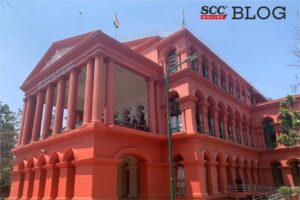Karnataka High Court: Suraj Govindaraj, J., allowed the petition and quashed the compromise decree in the original suit filed before Principal Senior Civil Judge at Hubballi in the Lok-Adalat proceedings.
The facts of the case are such that a compromise petition was filed before Principal Senior Civil Judge at Hubballi in the Lok-Adalat proceedings by a person claiming to be the power of attorney holder of the petitioner and as such the petitioner’s interest in the suit schedule property therein was compromised without the knowledge of the petitioner and therefore a fraud was committed on the petitioner by resorting to an abuse of the process of the Court and filing of a compromise petition in the Lok-Adalat. Thus instant petition was filed under Articles 226 and 227 of the Constitution of India praying to quash the compromise decree and restore the original suit before Principal Senior Civil Judge at Huballi on merits.
Counsel for petitioner Mr Mahesh Wodeyar submitted that the petitioner not having executed any power of attorney in favour of respondent 1, the power of attorney claimed by respondent 1 is fabricated one and as such neither the agreement of sale could be executed by respondent 1 in favour of respondent 2 nor could a compromise be entered into by the respondent 1 with respondent 2 for the Lok-Adalat to record. Thus, the petition needs to be allowed and the compromise recorded by the Lok-Adalat be set aside.
Counsel for the respondent Mr Padmanabha Mahale submitted that respondent 1 is the power of attorney holder of the petitioner and respondent 1 has entered into a compromise with the knowledge and consent of the petitioner with respondent 2. The compromise having been filed before the Court and the Court having forwarded the matter to the Lok- Adalat the compromise is one which is filed before the Court and as such the present petition is not maintainable since the trial Court having taken the compromise on record, only a suit challenging the compromise is maintainable.
The Court after perusing all the material facts observed that the plaintiff in a suit cannot array a defendant to be represented by power of attorney showing the address of the said power of attorney without even showing the address of the defendant. It was also observed that the net result of the entire proceedings and procedure followed is that the plaintiff who was not aware of the said proceedings, a compromise decree has been passed against the petitioner who though arrayed as a party to the preceding was never served with the notice nor did the defendant contest the said the proceedings. There is a procedural irregularity inasmuch as the compromise petition was filed before the Court and thereafter the matter referred to Lok-Adalat for recordal of the compromise.
The Court relied on Akkubai v. Venkatrao, 2014 SCC OnLine Kar 10110 and deprecated the said practice of recording compromise before the Court and thereafter referring to Lok-Adalat, as it is not contemplated in the Legal Services Authorities Act, 1987 and such compromise if recorded before the Lok Adalat is required to be set aside.
The Court also issued general directions in matters relating to compromise before the Lok Adalat which are challenged by way of writ petitions
(i) When a compromise is filed before the Court in terms of the decision in Akkubai v. Shri Venkatrao, 2014 SCC OnLine Kar 10110 it is for the Court to record the compromise and not refer the matter to the Lok- Adalat.
(ii) It is only if there is no settlement arrived at before the Court and the parties request for the matter to be referred to Lok-Adalat to enable a settlement then in such event the parties are to be referred to the Lok-Adalat and in the event of a compromise being arrived at before the Lok- Adalat, the same could be recorded by the lok- Adalat.
(iii) When the matter is referred to Lok-Adalat, separate order sheets would have to be opened and maintained by the said Lok-Adalat and the order sheet of the Court in the suit cannot be used by the Lok-Adalat.
(iv) The trial Court and or the Lok-Adalat while recording compromise is required to ascertain if the parties are present personally as also to ascertain and verify their identities by production of suitable documentary proof.
(v) In the event of a power of attorney appearing, it would be the bounden duty of the Court or the Lok-Adalat to ascertain if the concerned party has been served with notice.
(vi) The Court as also the Lok-Adalat would always have to be suspicious if the party were to enter appearance even before service of notice which is a red flag that there is something that is fishy in the matter.
(vii) When recording a compromise being entered into by a power of attorney, the original of the power of attorney is required to be examined by the Court and the Lok-Adalat and necessary endorsement made in the order to that effect and the original power of attorney returned to the parties.
(viii) As far as possible the trial Court and or the Lok- Adalat to secure the presence of the party and obtain signature of such party rather than the power of attorney.
(ix) The Trial Courts shall ensure that proper and acceptable proof of identity of the parties to proceedings as mandated by the Government for various purposes (such as Aadhar Card, Driving Licence, Passport Copy, Election Identity card, etc.,) are obtained as a matter of rule.
The Court allowed the petition and quashed the compromise decree dated 26-07-2014 in O.S. No.246/2014. [Renuka v. Ramanand, Writ Petition No. 103766 of 2018, decided on 31-03-2022]

